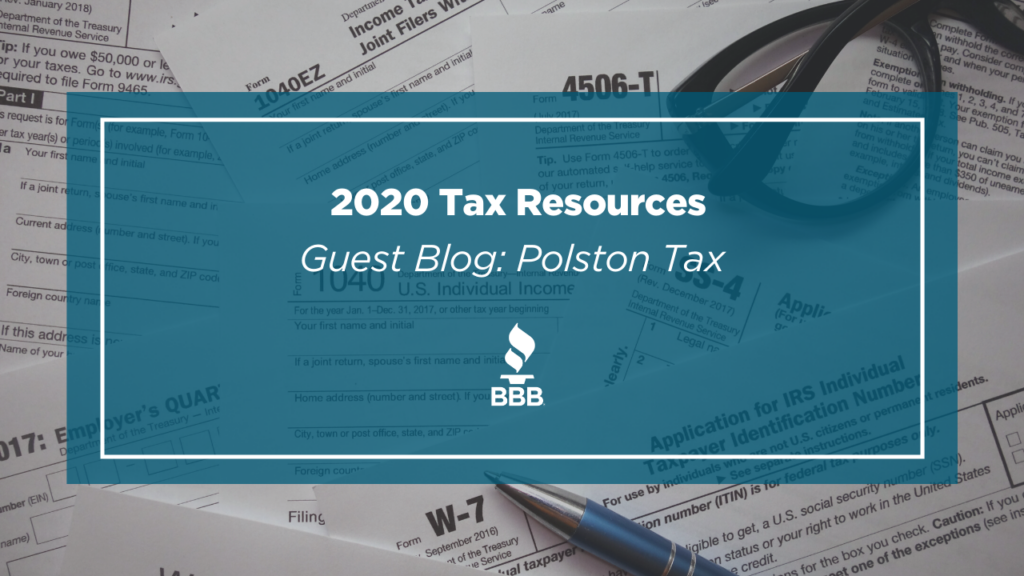
Guest Blog: Polston Tax, BBB® Accredited Business
As a business owner, you may feel you are paying over too much of your profits to the IRS and your state in taxes. The good news is that there are plenty of tax strategies that can be utilized to help keep more of your hard-earned money in your pocket! The tax code is complicated, but if you can navigate it in tactical ways you can ensure that you are paying the least amount possible.
The tax law changes that occurred recently have been kind specifically to business owners as the IRS created lower tax rates for Corporations and the new Qualified Business Income (QBI) Deduction for pass-through entities. Businesses with pass-through income that qualify for the 20% QBI Deduction include partnerships, S Corporations, and Sole Proprietorships.
These changes are exciting because it means that business owners now have additional options to consider as they expand their business activities that can optimize their tax results. It also means that business owners need to possibly reevaluate their current status and determine what tax structure makes the most sense for them now that we have new rules to apply. This leads me to one of the most important items all business owners need to consider when determining how they can reduce their taxes, business structure.
There are several possibilities business owners have when structuring their business. Sole proprietorships, Partnerships, Limited Liability Companies, Corporations, etc. Before deciding, consideration of short-term and long-term goals needs to occur. For instance, I have clients who want to sell their business over a certain time frame and plan to sell it again. This is just one example of a situation where a wrong decision about structure can result in someone paying a huge bill to the IRS, hundreds of thousands of dollars depending on the size of the sale. Also, two business owners can own the exact same business, earn the same revenue and incur the same expenses but pay substantially different tax amounts just based on how they are structured. Ensure you discuss with your tax professional what structure makes the most sense for you, as this decision does have a direct effect on the taxes you pay.
If you determine you should be structured as a pass-through entity, the next item you want to consider is how you can best qualify for the QBI deduction. I cannot imagine anyone not wanting a 20% deduction from their taxes. Therefore, it is crucial you speak to your tax professional about how to best set up your business to qualify for and optimize the QBI deduction. This deduction is not as easy as just taking a 20% deduction if you are a business owner. There are several qualifications you must meet, limitations if you exceed certain income amounts, and wage and asset requirements that can come in to play with your deduction. Yes, the IRS never makes anything easy and (as shocking as it is) they didn’t make this easy either.
There are other factors when determining business structure. Certain tax structures that may have optimal benefits in several ways, may have restrictions for allowing deductions for things such as owner and family medical expenses, retirement, insurance and a variety of other expenses. Depending on your specific circumstances, these items need to be included in the decision-making process. A well-crafted decision can result in business owners getting to deduct personal expenses that wouldn’t normally be allowed. Having a full conversation with your tax professional about your personal expenses will help them develop a plan that is tailored to your circumstances.
So often business owners make impulsive decisions on how their businesses should be structured because they just want to get started as soon as possible. However, they cannot fully comprehend the impact this decision has on their taxes. More taxes results in fewer profits, so having someone who can assist in developing a full plan for you is crucial in ensuring your business has reached its full potential. A tax professional who understands full tax planning can maximize your tax deductions and tax credits while helping you stay compliant with the IRS and your state’s revenue agency. If you need help constructing a plan, Polston Tax can help.
For more resources and information on taxes, visit PolstonTax.com.